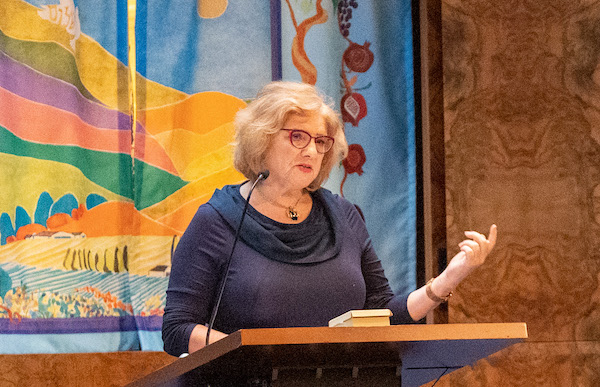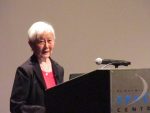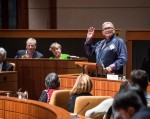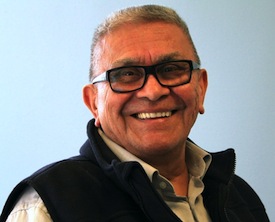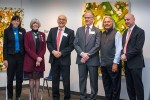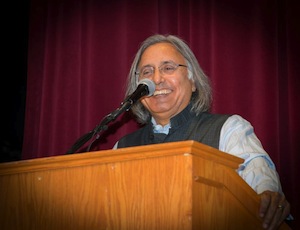Marina Sonkina shares her experiences as a volunteer with the JDC in Poland last year, helping Ukrainian refugees. (photo by Masumi Kikuchi)
This year’s annual Raoul Wallenberg Day in Vancouver honoured the American Jewish Joint Distribution Committee (JDC) for “its courageous support for Ukrainian refugees.”
“In addition to vast internal displacement, from a population of 41 million Ukrainians, eight million (mostly women and children, and some seniors) have fled to Europe and other parts of the world,” said Alan Le Fevre in his opening remarks.
Le Fevre is on the board of directors of the Wallenberg-Sugihara Civil Courage Society, which hosts the Wallenberg Day commemorations. This year, the event was presented in partnership with Congregation Beth Israel, and it took place at the synagogue on Jan. 22.
The JDC’s work helping Ukrainian refugees “continues its illustrious history,” said Le Fevre, noting that, “since its founding in 1914, the JDC has provided support for refugees whenever and wherever needed, propelled by Jewish values and a commitment to mutual responsibility.”
The City of Vancouver’s proclamation of this year’s Wallenberg Day was read by Deputy Mayor Sarah Kirby-Yung, attending on behalf of Vancouver Mayor Ken Sim. She was joined by Councilor Mike Klassen.
Kirby-Yung had helped celebrate the start of the Lunar New Year that morning, and still had on the red jacket she had worn for that event because the Asian community “has suffered much in the past few years, [with] anti-Asian hate and, sometimes, that plight has been very analogous to what our Jewish community has suffered” and one of the best things about the city, and what she sees in the work of the JDC, is “communities and cultures, and people of different faiths and backgrounds, who come together to stand against injustice and to support each other.”
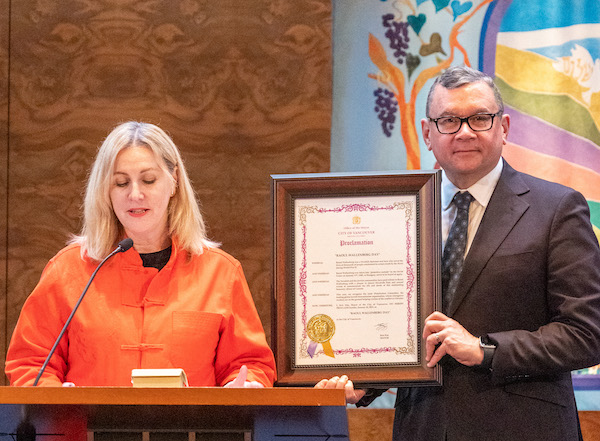
WSCCS board member George Bluman introduced the afternoon’s guest speaker, Dr. Marina Sonkina, a local educator and writer. “Soon after Russia attacked Ukraine, Marina applied to volunteer with the Jewish Joint Distribution Committee, as someone who speaks Russian, Ukrainian and other languages and as someone who has been a refugee herself,” he said. “Almost immediately, she was accepted and flew to Poland at the end of March.
“After arriving in Warsaw, about five hours later, Marina was at the Polish-Ukrainian border, where she served in a camp as a frontline responder, offering fleeing refugees medical and psychological support.”
Sonkina, who has relatives in Russia and Ukraine, said most of her family is out of Russia at this point.
“If we are talking about why didn’t Russians resist,” she said, “I think those more than one million people who left Russia when the draft, conscription, was announced, that is the only accessible form of not revolt, but saying no to Putin. Otherwise, it is pretty much a fascist state.”
While Putin is the person who launched the war, she wondered about others’ culpability: all those who overlooked Putin’s actions over the 22 years of his being power, which has seen him poison his opponents and annex Crimea, among other things. What was the West’s role, she asked, as they worked with Putin as a business partner first, putting his authoritarianism second?
In Warsaw, Sonkina was one of the people who met Holocaust survivors being extracted from Ukraine, to be housed in Germany. The next day, she worked in a refugee camp, where there were already more than two million refugees. (For more on Sonkina’s experience in Poland, read her account at jewishindependent.ca/helping-ukrainian-refugees.)
JDC helped everybody, said Sonkina. A moral responsibility to repair the world, tikkun olam, is part of JDC’s mandate and she saw this responsibility in action. She remarked on the goodwill of people from around the world, of a range of ages, who were helping in different ways, including taking refugees into their homes. The strength and independence of the refugees also left an impression on Sonkina – they didn’t want to take handouts, she said, and they wanted to know whether they could get jobs in the country that harboured them.
“One of the things that I quickly realized – a part of persuading them to go to this country or that was just the human contact that was so important,” she said. The refugees she met had experienced such trauma, and her acknowledgement of what they had gone through allowed some of them to cry. “It was sometimes hard,” Sonkina admitted, visibly emotional. “But there were also funny stories,” she added, sharing a couple of those stories before WSCCS board member Gene Homel took the podium.
An historian teaching about Europe in the 20th century for many years, Homel had been in Ukraine eight or nine years ago, and he echoed what Sonkina had said about Ukrainians’ “intense loyalty” – “the attachment to the land, culture and language” – but, he said, “I want to make the point that, in Ukraine today, the focus of loyalty is a civic one, it’s on the national state rather than ethnicity, it’s a pluralistic and multiethnic society that’s being created, forged largely as a result of Russia’s criminal attack on Ukraine.”
Homel provided a brief overview of the JDC’s work from its founding in 1914 to its current work with Ukrainian Jews and non-Jews, and he introduced businessman and philanthropist Gary Segal, who became familiar with JDC’s work in 2007, on a Jewish Federation of Greater Vancouver trip to Ethiopia, led by JDC professionals. He’s been a board member since 2012.
“I marvel at the compassion, intelligence, resourcefulness and resolve with which the dedicated staff and volunteers carry on their sacred work,” said Segal, noting that JDC helps communities of all backgrounds and faiths, and doesn’t just respond to acute situations, but also to endemic poverty, food insecurity and the plight of refugees, as well as antisemitism.
“Since 1914, we’ve rescued more than one million Jews in danger, from places like Ethiopia, Yemen, Bosnia and Herzegovina, and Ukraine,” said Segal, who spoke about various JDC initiatives, including its medical programs in countries like Ethiopia.
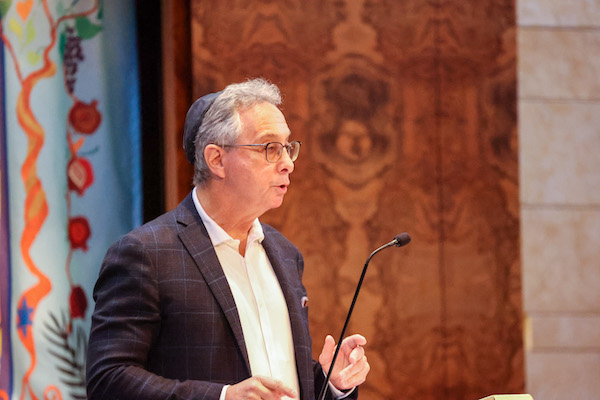
It was on that 2007 trip that Segal met Dr. Rick Hodes, JDC’s medical director in Ethiopia, whose care for kids with severe spinal deformities (with Ghanaian spine surgeon Dr. Oheneba Boachie-Adjei) inspired Segal to get involved, too. He brought a young Ethiopian to Vancouver for back surgery and established in Vancouver the organization Bring Back Hope, which has raised some $3 million to support spine surgeries, preventative screening, and more. (See jewishindependent.ca/oldsite/archives/jan11/archives11jan14-02.html and several articles on jewishindependent.ca.)
Returning to JDC’s work in Ukraine since the war began, Segal noted that, to date, the organization “has cared for 35,000 vulnerable and elderly poor; it evacuated 13,000 Jews from Ukraine; provided over 40,000 refugees with food, medicine, trauma support; received over 19,000 incoming calls at the emergency centre; and provided over 1.3 million pounds of humanitarian assistance.”
Segal then brought his talk around to Raoul Wallenberg, Sweden’s special envoy to Hungary in 1944, who saved tens of thousands of Jews from deportation and death. “The original fund of $100,000 that [Wallenberg] received from the War Refugee Board came from the American Joint Distribution Committee and, when that was finished, he received additional funds from the JDC,” said
Segal, who concluded, “I would say, so much of what JDC does is giving hope. Hope is a powerful word, an essential element in everyone’s life…. Hope can give us the strength and the will to continue in our darkest moments, to aspire and believe that things can and will be better.”
On behalf of the JDC, Segal accepted, with thanks, the Wallenberg-Sugihara Civil Courage Award from Le Fevre.
Other components of the afternoon included a few words from Beth Israel’s Rabbi Jonathan Infeld, a short documentary on Norwegian Fridtjof Nansen, who received the 1922 Nobel Peace Prize for his work on behalf of displaced persons after the First World War, and a compilation of JDC’s work in Ukraine since the Russian invasion.
WSCCS board member Judith Anderson introduced the videos, giving more of Nansen’s background and achievements, including “the repatriation of 450,000 prisoners of war, mostly held in Soviet Russia” and “[in] response to a severe famine in Soviet Russia, Nansen directed relief efforts that saved between seven million and 22 million people from starvation.”
Anderson said, “The Nansen story is directly relevant to Ukraine. The headquarters for Nansen’s mission to Russia was in Ukraine’s Kharkiv, and Nansen donated part of his Nobel Peace Prize money to establish a major agricultural project in Ukraine.”
She thanked the Norwegian Refugee Council and the Nobel Peace Centre for permission to show the videos about Nansen and JDC staff members and directors – Shaun Goldstone, Solly Kaplinski and Alex Weisler – for compiling the material for the Ukraine Crisis video.
The Wallenberg-Sugihara Civil Courage Society is named after Wallenberg for his actions during the Holocaust, and Chiune Sugihara, who, as vice-consul in Lithuania for Japan during the war, issued transit visas that allowed thousands of Jews from Poland and Lithuania to escape. For more information on the society and to see videos of the Jan. 22 event, visit wsccs.ca.

